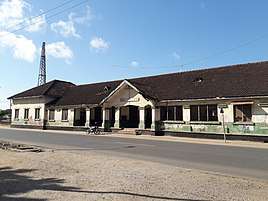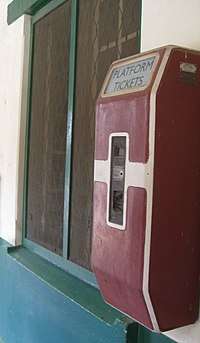Usambara Railway
The Usambara Railway (German: Usambarabahn) was the first railway to be built in German East Africa and what is today Tanzania.
| Usambara Railway | ||||||||||||||||||||||||||||||||||||||||||||||||||||||||||||||||||||||||||||||||||||||||||||||||||||||||||||||||||||||||||||||||||||||||||||||||||||||||||||||||||||||||||||||||||||||||||||||||||||||||||||||||||||||||||||||||||||||||||||||||||||||||||||||||||||||||||||||||||||||||||||||||||||||||||||||||||||||||||||||||||||
|---|---|---|---|---|---|---|---|---|---|---|---|---|---|---|---|---|---|---|---|---|---|---|---|---|---|---|---|---|---|---|---|---|---|---|---|---|---|---|---|---|---|---|---|---|---|---|---|---|---|---|---|---|---|---|---|---|---|---|---|---|---|---|---|---|---|---|---|---|---|---|---|---|---|---|---|---|---|---|---|---|---|---|---|---|---|---|---|---|---|---|---|---|---|---|---|---|---|---|---|---|---|---|---|---|---|---|---|---|---|---|---|---|---|---|---|---|---|---|---|---|---|---|---|---|---|---|---|---|---|---|---|---|---|---|---|---|---|---|---|---|---|---|---|---|---|---|---|---|---|---|---|---|---|---|---|---|---|---|---|---|---|---|---|---|---|---|---|---|---|---|---|---|---|---|---|---|---|---|---|---|---|---|---|---|---|---|---|---|---|---|---|---|---|---|---|---|---|---|---|---|---|---|---|---|---|---|---|---|---|---|---|---|---|---|---|---|---|---|---|---|---|---|---|---|---|---|---|---|---|---|---|---|---|---|---|---|---|---|---|---|---|---|---|---|---|---|---|---|---|---|---|---|---|---|---|---|---|---|---|---|---|---|---|---|---|---|---|---|---|---|---|---|---|---|---|---|---|---|---|---|---|---|---|---|---|---|---|---|---|---|---|---|---|---|---|---|---|---|---|---|---|---|---|---|---|---|---|---|---|---|---|---|---|---|---|---|---|---|---|---|---|---|---|---|
| Overview | ||||||||||||||||||||||||||||||||||||||||||||||||||||||||||||||||||||||||||||||||||||||||||||||||||||||||||||||||||||||||||||||||||||||||||||||||||||||||||||||||||||||||||||||||||||||||||||||||||||||||||||||||||||||||||||||||||||||||||||||||||||||||||||||||||||||||||||||||||||||||||||||||||||||||||||||||||||||||||||||||||||
| Locale | German East Africa | |||||||||||||||||||||||||||||||||||||||||||||||||||||||||||||||||||||||||||||||||||||||||||||||||||||||||||||||||||||||||||||||||||||||||||||||||||||||||||||||||||||||||||||||||||||||||||||||||||||||||||||||||||||||||||||||||||||||||||||||||||||||||||||||||||||||||||||||||||||||||||||||||||||||||||||||||||||||||||||||||||
| Website | www | |||||||||||||||||||||||||||||||||||||||||||||||||||||||||||||||||||||||||||||||||||||||||||||||||||||||||||||||||||||||||||||||||||||||||||||||||||||||||||||||||||||||||||||||||||||||||||||||||||||||||||||||||||||||||||||||||||||||||||||||||||||||||||||||||||||||||||||||||||||||||||||||||||||||||||||||||||||||||||||||||||
| Technical | ||||||||||||||||||||||||||||||||||||||||||||||||||||||||||||||||||||||||||||||||||||||||||||||||||||||||||||||||||||||||||||||||||||||||||||||||||||||||||||||||||||||||||||||||||||||||||||||||||||||||||||||||||||||||||||||||||||||||||||||||||||||||||||||||||||||||||||||||||||||||||||||||||||||||||||||||||||||||||||||||||||
| Line length | 350.5 km (217.8 mi) + 86.1 km (53.5 mi) | |||||||||||||||||||||||||||||||||||||||||||||||||||||||||||||||||||||||||||||||||||||||||||||||||||||||||||||||||||||||||||||||||||||||||||||||||||||||||||||||||||||||||||||||||||||||||||||||||||||||||||||||||||||||||||||||||||||||||||||||||||||||||||||||||||||||||||||||||||||||||||||||||||||||||||||||||||||||||||||||||||
| Track gauge | 1 Meter | |||||||||||||||||||||||||||||||||||||||||||||||||||||||||||||||||||||||||||||||||||||||||||||||||||||||||||||||||||||||||||||||||||||||||||||||||||||||||||||||||||||||||||||||||||||||||||||||||||||||||||||||||||||||||||||||||||||||||||||||||||||||||||||||||||||||||||||||||||||||||||||||||||||||||||||||||||||||||||||||||||
| Minimum radius | 150 m | |||||||||||||||||||||||||||||||||||||||||||||||||||||||||||||||||||||||||||||||||||||||||||||||||||||||||||||||||||||||||||||||||||||||||||||||||||||||||||||||||||||||||||||||||||||||||||||||||||||||||||||||||||||||||||||||||||||||||||||||||||||||||||||||||||||||||||||||||||||||||||||||||||||||||||||||||||||||||||||||||||
| Maximum incline | 2.5 % | |||||||||||||||||||||||||||||||||||||||||||||||||||||||||||||||||||||||||||||||||||||||||||||||||||||||||||||||||||||||||||||||||||||||||||||||||||||||||||||||||||||||||||||||||||||||||||||||||||||||||||||||||||||||||||||||||||||||||||||||||||||||||||||||||||||||||||||||||||||||||||||||||||||||||||||||||||||||||||||||||||
| ||||||||||||||||||||||||||||||||||||||||||||||||||||||||||||||||||||||||||||||||||||||||||||||||||||||||||||||||||||||||||||||||||||||||||||||||||||||||||||||||||||||||||||||||||||||||||||||||||||||||||||||||||||||||||||||||||||||||||||||||||||||||||||||||||||||||||||||||||||||||||||||||||||||||||||||||||||||||||||||||||||
History
German East-Africa
A railway company was created in 1891 with the aim, to connect the port of Tanga at the Indian Ocean with the Lake Victoria by passing south of the Usambara Mountains. 1,000 mm (3 ft 3 3⁄8 in) gauge was chosen. Since June 1893 the line advanced from Tanga inland. Due to undercapitalization the company had to be taken over by the state in 1899. Thereafter the line was run by the Ostafrikanische Eisenbahngesellschaft (East African Railway Cooperation), a company which had been created to build and operate the Tanganyika Central Line (Zentralbahn) from Dar es Salaam to Kigoma. Between Pongwe and Ngommi on the Usambara Railway there was a double hairpin turn. Around 1910, a cable spur (the Seilbahn) was constructed to connect the line with the sawmills at Neu-Hornow.
On 26 September 1911 the track reached Moshi at Mount Kilimanjaro after 351.4 km (218.3 mi). Traffic on the whole line commenced on 4 October 1911, the official inauguration took place on 7 February 1912. In 1914 one train ran from Tanga to Buiko and back daily and on two days of the week the service continued to and from Moshi. The trip over the entire distance took 14 hours 40 minutes.
From the station Tengeni to the town of Sigi there was a branch-line of 23.3 km (14.5 mi) constructed with 750 mm (2 ft 5 1⁄2 in) gauge possessing four hairpin turns on its course.
From 4 June 1912 – 12 May 1913 the line was renamed Nordbahn (Northern Railway) for a short period. The extension to Arusha was already planned and money provided but was not built due to the start of World War I.
British Mandate
The British mandate, which took over Tanganyika from the Germans, connected the Usambara Railway between Moshi and Voi with the Uganda Railway in Kenya and extended it 1929 to its current termination point Arusha.
Tanzania
After the Tanzanian independence the Tanzania Central Line and the Usambara Railway were connected between Mruazi and Ruvu. During the East African Community, which covered Kenya, Uganda and Tanzania, the Usambara Railway belonged to the East African Railways (EAR). This community was dissolved in 1977 and the Usambara Railway became part of the Tanzania Railways Corporation which was taken over in 2007 by an Indian investor.
Service
Under the German rule in 1913, the Usambara Railway operated 18 locomotives, 31 carriages and 199 trucks with 562 employees (of which 35 were Europeans).
After construction of the connection to Voi, traffic between Arusha, Moshi and the coast was directed to the port of Mombasa and the eastern part of the Usambara Railway was reduced to a local service. The passenger traffic was handled with four DMUs during this time. Passenger trains operated on the line into the 1990s.
In 2018, the Government of Tanzania invested 5.7 billion Tanzanian Shillings to rehabilitate the line. As of July 2019, diesel powered cargo trains are leaving Tanga Railway Station again and passenger transport between Tanga and Arusha is set to start in September 2019.[1]
Gallery
- One of the many small (loading) stations lining up along the railtracks
 Moshi Railway Station
Moshi Railway Station Tanga Railway Station
Tanga Railway Station Platform ticket machine in Tanga
Platform ticket machine in Tanga Tracks
Tracks Diesel locomotive at Tanga Railway Station in 2019
Diesel locomotive at Tanga Railway Station in 2019
References
- "Why Tanzania, Kenya and Uganda are falling back to old railway". The Citizen. Retrieved 29 July 2019.
Bibliography
- Helmut Schroeter: Die Eisenbahnen der ehemaligen deutschen Schutzgebiete Afrikas und ihre Fahrzeuge = Die Fahrzeuge der deutschen Eisenbahnen 7. Frankfurt 1961.
External links
- A map of the line, following its annexation by Britain and connection to the Kenyan system